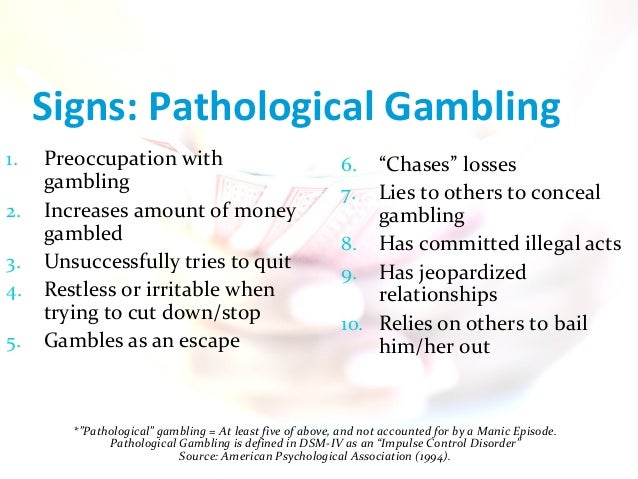What Is Problem Gambling Definition

Gambling is defined as any activity where an item of value is placed at risk in an attempt to gain something of greater value. For example, when we pay a dollar to buy a lottery ticket with the hope that we will a million dollars.
Gambling behavior can be classified into four categories:
Gambling becomes an addiction when it is something you or a loved one cannot control and when it begins to affect a person’s financial, familial, social, recreational, educational, or occupational functioning. 1,2 Gambling addiction, much like some forms of substance addiction, is associated with a release of dopamine in the brain as much as. Gambling definition, the activity or practice of playing at a game of chance for money or other stakes. Problem gambling is probably a bigger problem than most people think. And blaming the sick person is almost certainly the wrong approach. Vilifying problem gamblers or categorizing them as weak people with low character, does little to help improve society. It’s also not fair or accurate.

- non-problem
- low-risk
- moderate-risk
- problem gamblers

Understanding Problem Gambling Terminology
The Australian Ministerial Council on Gambling defines problem gambling as ‘difficulties in limiting money and/or time spent on gambling which leads to adverse consequences for the gambler, others, or for the community’ (SA Centre for Economic Studies, 2005).

Over the past few decades there has been a lot of debate over the definition and classification of various addictive behaviors, including problem gambling. Diagnostic phrases have varied from “pathological gambling” and “compulsive gambling” to “gambling addiction” as well as the latest diagnosis, “disordered gambling.” As terms have changed, the criteria for diagnosis have changed as well. At the QCFE we most often utilize the term “problem gambling” to encompass various levels of difficulty experienced by those suffering consequences as a result of their gambling behavior.
Gambling Disorder Diagnosis
The DSM is the standard classification of mental disorders used by mental health professionals in the United States. It is currently in its fifth edition. The condition previously termed “pathological gambling” was retitled as “gambling disorder” and reclassified in the DSM-5.
The criteria for diagnosis is as follows:
“Persistent and recurrent problematic gambling behavior leading to clinically significant impairment or distress, as indicated by the individual exhibiting four (or more) of the following in a 12-month period:
What Is Problem Gambling Definition Psychology
- Needs to gamble with increasing amounts of money in order to achieve the desired excitement.
- Is restless or irritable when attempting to cut down or stop gambling.
- Has made repeated unsuccessful efforts to control, cut back, or stop gambling.
- Is often preoccupied with gambling (e.g., having persistent thoughts of reliving past gambling experiences, handicapping or planning the next venture, thinking of ways to get money with which to gamble).
- Often gambles when feeling distressed (e.g., helpless, guilty, anxious, depressed).
- After losing money gambling, often returns another day to get even (“chasing” one’s losses).
- Lies to conceal the extent of involvement with gambling.
- Has jeopardized or lost a significant relationship, job, or educational or career opportunity because of gambling.
- Relies on others to provide money to relieve desperate financial situations caused by gambling.”